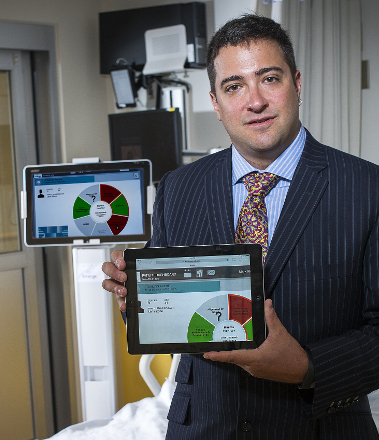 The Project Emerge app at Johns Hopkins.
The Project Emerge app at Johns Hopkins.
As hospitals bring remote patient monitoring and connected apps into their intensive care units, they're finding opportunities to not just increase efficiency of care, but also to improve the experience of being in or of having a family member in the ICU, according to a new report in the Wall Street Journal.
The WSJ article focuses on three different projects: Project Emerge, at Johns Hopkins University, the Patient-Centered ToolKit at Brigham and Women's Hospital, and MyICU, a project under development at Beth Israel Deaconess.
At Johns Hopkins, the first step of the process is an electronic harms monitor that tracks patient vital signs and tasks that need to be completed for each patient, alerting staff when something needs to be done. Alerts are color-coded, so more urgent ones might be red, and lower-priority ones might be yellow.
But the next step of the process puts a tablet into the hands of the patients' family, and allows them to have some say in what shows up in that back end. Family members can request to help with day-to-day tasks like washing a patient's hair or helping them get up and walk. They can also use the tablets to ask doctors questions, learn about the machines in the room, and record their own care goals for the patients, which will then be available for doctors to see and use as an additional metric to evaluate patient care.
In developing these projects, each of the hospitals involved have found that patients often feel like they're treated with respect and dignity in the ICU. Mobile software that allows patients and families a direct line to their care team -- that doesn't involve physically tracking down a busy ICU doctor or nurse -- lets families air those concerns and allows hospitals to become progressively better at ameliorating them.
Outside of the ICU, hospitals have seen myriad benefits from getting tablets into the hands of patients. A Mayo Clinic study reported 98 percent engagement with a tablet app for recovering cardiac patients. Boston Children's hospital has found success with the MyPassport app that helps parents keep track of their child's care team and scheduled procedures, and Miami Children's has a similar app for parents.


















